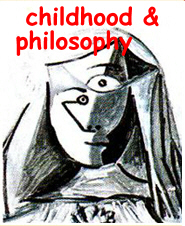educating “homo videns”. philosophy for children as a way of countering the “antimeditative situation” of our time and of fostering the democratic attitude
Abstract
Homo videns is today’s man or woman whose knowledge-frames are shaped by the use of modern media. The passive experience (from childhood on) of an overwhelmingly image-based media can prevent children from developing a capacity for abstraction--that is, the ability to form general concepts, to make comparisons, and to acknowledge different points of view. What is at stake is the future of democracy as a form of life that rests on rational discussion and argumentative skills. Philosophy for Children offers an effective means to counter this phenomenon. If homo videns is (or risks being) overwhelmed by the immediacy of the medium and narcotized by ‘un-reflection’ like a prisoner in Plato’s cave, children and adolescents who participate in the discourses of Philosophy for Children have the opportunity to experiment with thinking, to have first-hand experience in the co-construction of knowledge, and thereby to become citizens of a real and effective democracy. Key-words: Homo vindens; philosophy for children; democracy; childhoodDownloads
Download data is not yet available.
Downloads
Published
2010-04-27
How to Cite
OLIVERIO, Stefano. educating “homo videns”. philosophy for children as a way of countering the “antimeditative situation” of our time and of fostering the democratic attitude. childhood & philosophy, Rio de Janeiro, v. 3, n. 6, p. pp. 241–265, 2010. Disponível em: https://www.e-publicacoes.uerj.br/childhood/article/view/20520. Acesso em: 18 jul. 2025.
Issue
Section
articles




